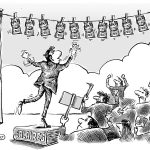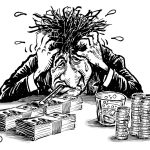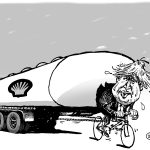Watch out for post-Christmas pitfalls
Measures against the pandemic have accentuated inequalities. Getting rid of the rags of 2020 won’t be so easy.
Without regrets, we said goodbye to 2020. The coming year brings hopes for a release from the restrictions linked to sanitary lockdowns and a general and vigorous rebound in economic activity, which will allow us to recover much of the lost ground. However, whether like it or not, it is not possible to “make a clean slate of the past.” I am even among those who think that this formula leads to many disasters and that it is better to learn the lessons from history.
No doubt that the year ahead will bring us its share of surprises. From black swans to gray rhinoceros, continuities stand out much more clearly than ruptures, as the economic and structural challenges that await us have become more evident. Let us start with the most obvious: the pandemic is still part of our daily lives. Before reaching the critical threshold of collective immunity, we will remain under the threat of temporary restrictions of activities. An economic recovery marked by such jolts could turn out to be more mediocre and erratic than anticipated. Governments will once again be in the spotlight, this time for their ability to provide serums and organize the vaccination of the population in the best possible way – that is to say, as quickly as possible. Moreover, what about international cooperation and coordination to ensure a return to open borders? Because the control of the pandemic requires a general vaccination. Recall that by Johns Hopkins University, to date, 191 countries are infected, i.e the whold world.
Debate over debt forgiveness is likely to swell. To the point of destabilizing the markets? We cannot exclude this possibility.
While waiting for the vaccine for all, the pandemic will leave deep scares in our countries and societies. The almost complete collapse of certain activities, rising unemployment, access to healthcare and public assistance have accentuated inequalities. For the first time in 30 years, poverty is no longer declining in the world. The World Bank estimates that by 2021, 150 million more people will have fallen into extreme poverty, over 80% of them in so-called middle-income countries1. Moreover, the Organization highlights the decline in “shared prosperity” caused by the pandemic. Inequalities have widened, recovery alone does not guarantee a return to the state of previous progress.
Already, many voices are calling for the implementation or extension of more generous investment financing and redistribution programs. This is particularly the case with economist Joseph Stieglitz who calls for “conquering the Great Divide”2. However, the crisis has led almost everywhere to an increase in public and private debts, to the point of becoming unsustainable in some cases. The G-20 member countries have pledged to suspend part of the reimbursements of the poorest countries. What about the debt management of advanced economies? At the bedside of their frozen economies, most government’s massive financial support has stemmed many hemorrhages. So much so that in France for example, the number of bankruptcies recorded in 2020 was lower than the previous year for small and medium-sized businesses. These safeguard measures have spared several sectors which, apart from this exceptional situation, would not have had any difficulties. But how to recognize among them the “zombies”, which should have disappeared anyway? Delayed bankruptcies should mar the expected rebound.
Even partially relieved by the economic rebound, countries will not easily get rid of the burden of accumulated debts, especially when they add to previous and sometimes already heavy financial burdens. Debate over debt forgiveness is likely to swell. To the point of destabilizing the markets? We cannot exclude this possibility. There is little doubt that, whatever the good intentions displayed, budgetary and monetary authorities everywhere will have to take back control of their hitherto generous distribution policies. Raising taxes in the United States, reducing and refocusing spending in Europe, increasing interest rates elsewhere … The remedies are well known, only the dosages will vary.
Without crying out for austerity, we will have to put up with it.
1 See The World Bank, October 7, 2020, «Covi-19 to add as many as 150 million extreme poor by 2021» https://www.worldbank.org/en/news/press-release/2020/10/07/covid-19-to-add-as-many-as-150-million-extreme-poor-by-2021
2 «Conquering the Great Divide» Joseph Stieglitz viewpoint published for the September 2020 issue of the IMF’s Finance & Development magazine. https://www.imf.org/external/pubs/ft/fandd/2020/09/COVID19-and-global-inequality-joseph-stiglitz.htm
Published in French in allnews.ch on Jan 5th, 2021 Cartoon © Barrett



